© 2014, 2023, Christian Cassidy
Renovations to a store at Euclid Avenue and Grove Street in Point Douglas uncovered a bit of Manitoba history on Thursday. It is a hand-painted sign for an old Manitoba company called Constant Macaroni.
The owners of the building have said that they will find a way to finish the renovations without having to cover it back up!
Here is a look back at the history of the Constant Macaroni Company.
Top: Constant Family ca. 1924 (source, p. 216)
Bottom: 1911 Census of Canada, Library and Archives Canada
Henri and Marguerite Constant emigrated to Quebec from Marseilles, France in 1903. There, they had three children, Jean, Madeleine, and Fernand, before moving to St. Boniface in 1909. The 1911 census clip above shows the four of them living at 61 rue Masson. (A fourth child, Lucien, would be born in 1912).Henri came from a pasta making family, a descendant told Winnipeg Tribune columnist Marjorie Earl that the Constants had been producing pasta in Marseilles since 1823. It is only fitting that the year after his arrival in St. Boniface, Henri appears in the Henderson Street Directory as a "macaroni manufacturer" with a shop at 60 boul Provencher.
In July 1913, Constant got a $9,885 building permit to construct a new macaroni factory at 138 rue Dumoulin and the family either bought or built a house next door at 128 Dumoulin.
Winnipeg's only pasta factory was a family affair as the children worked there as they grew up.
Top: 254 Dumoulin, August 21, 1936, Winnipeg Free Press
Bottom: September 25, 1915, Winnipeg Tribune
Bottom: September 25, 1915, Winnipeg Tribune
In 1915, the Constant family's macaroni factory was re-branded The Excelsior Macaroni Products Company with Henri Constant as president. It was launched with an advertising campaign and free samples served on the third floor of Eatons.
A sign that the population at large may not have been used to pasta is that Excelsior's earliest newspaper ads went into detail about how to use it in everyday dishes like soups and stews, or even as a main course, as a good substitute for meat.
Excelsior Macaroni was sold at stores throughout the province and it was time for larger premises. The family bought an existing house at what became known as 254 1/2 rue Dumoulin and on the property built a three-storey factory and warehouse numbered 254 rue Dumoulin.
A sign that the population at large may not have been used to pasta is that Excelsior's earliest newspaper ads went into detail about how to use it in everyday dishes like soups and stews, or even as a main course, as a good substitute for meat.
Excelsior Macaroni was sold at stores throughout the province and it was time for larger premises. The family bought an existing house at what became known as 254 1/2 rue Dumoulin and on the property built a three-storey factory and warehouse numbered 254 rue Dumoulin.
Catelli Macaroni Products of Montreal was created in 1928 when eight companies, led by C. H. Catelli Ltd. of Montreal, merged in a bid to create a national pasta manufacturing company. This was typical in the Canadian food manufacturing industry at the time as groupings of bakeries, dairies, confectioners, etc. amalgamated looking to make a national impact.
One of the eight companies included in the Catelli merger was Excelsior Macaroni Products Company and Henri Constant became the manager of Catelli's Winnipeg operations. Street directories show that some of the children, including Madeleine and Fernand, also worked for Catelli.
Catelli wanted to make Winnipeg its manufacturing centre for Manitoba and most of Saskatchewan. To do that, it needed a larger factory and warehouse and purchased the Turner & Walker Block at 425 Henry Street in February 1929.
June 28, 1932, Winnipeg Free Press
The arrival of Catelli did not mean the end of Excelsior Macaroni as its products appear in grocery store ads, primarily at the Piggly Wiggly chain, until the mid-1930s.
It is unclear why the two brands competed in the same marketplace.
In the case of some national food manufacturing conglomerates, particularly bakeries, they took over a local factory and provided a menu of nationally-known products it had to produce, such as three types of bread loaves and dinner buns. If the local bakery had other products it was known for that were not on the national menu, maybe a rye bread, cakes, English muffins, etc., they might continue to produce and market those locally under the old name. For Catelli and Excelsior, however, the product they were producing was pasta noodles.
Henri Constant remained in charge of the local Catelli operation, with Fernand as head of shipping, until 1936. That's the same year Catelli announced in April that it was financially reorganizing the company and changing its name to Catelli Macaroni Products Corporation.
By this time, Henri was around 59 years of age and it seems he semi-retired from the pasta business.
Marguerite Constant died in 1951 at the age of 71. Henri died in 1970 at the age of 92.
In late 1936, after Henri and Fernand left Catelli, the Constant children opened a pasta factory of their own. Madeleine and Lucien were co-owners according to this source, though Fernand is also listed in street directories as working there. Their factory was the old Excelsior plant next to the family home at 254 rue Dumoulin.
Constant made macaroni, vermicelli, spaghetti and egg noodles that were carried throughout Western Canada by retailers such as Safeway.
Madeleine was in charge of packaging and distribution at Constant and also became the public face of the company through her "Madeleine Constant Recommends" ads in the 1950s. She was also a patron of St. Boniface Hospital and College Saint Boniface.
Constant made macaroni, vermicelli, spaghetti and egg noodles that were carried throughout Western Canada by retailers such as Safeway.
Madeleine was in charge of packaging and distribution at Constant and also became the public face of the company through her "Madeleine Constant Recommends" ads in the 1950s. She was also a patron of St. Boniface Hospital and College Saint Boniface.
In August 1962, a fire started at the old macaroni factory at 254 Dumoulin. One firefighter was injured and three families in nearby homes had to flee. The Free Press reported that "Hundreds of spectators crowded Dumoulin Street to watch the spectacular blaze, which at times looked like an enormous chimney on fire."
The factory was destroyed and the company relocated to a new space at 307 Archibald Street.
How the company came to a close is unclear.
Lou Constant, (perhaps Lucien?), told Winnipeg Tribune columnist Marjorie Earl in 1979 that the Constant Macaroni Company was sold to Romi Macaroni, a division of Catelli Foods, shortly before Henri's death in 1970.
A legal notice in the Winnipeg Tribune, however, announced the September 5, 1973 bankruptcy sale of Constant Macaroni, 307 Archibald Street, including its building and all of its contents. It is unclear what happened at that sale as there was a "close out auction sale" of Constant Macaroni's equipment at 307 Archibald Street three years later on August 24, 1976.
Jean Constant died in 1985, Lucien in 1993, Madeleine in 1996, and Fernand in 2001.
This is an April 2023 update of a post written in September 2014.
Related:
- Framing Our Past: Constructing Canadian Women's History in the Twentieth Century - McGill-Queens University Press (To read the Madeleine Constant section.)
- Catelli Macaroni's Winnipeg History - West End Dumplings (coming soon)
Madeleine Constant Recommends:
Madeleine Constant Recommends:
October 23, 1954, Winnipeg Tribune
More Constant Macaroni Ads
September 25, 1915, Winnipeg Tribune
March 25, 1947, Winnipeg Tribune












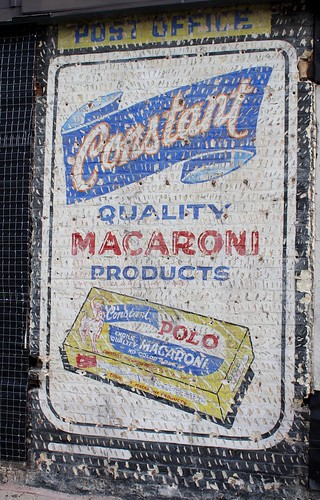
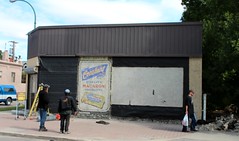

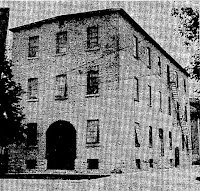





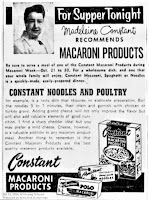







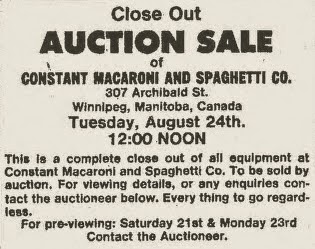
No comments:
Post a Comment